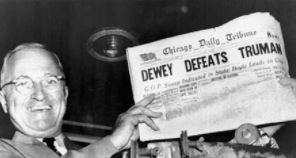Just for fun, and to provide a little perspective on our present political perturbations, see if any of this sounds familiar. The answer or speaker in each paragraph corresponds to the same number at the bottom of the page.
1. “A burden of doubt had been cast over” the press. When the wrong man won, reporters and editors said they had been deluded, “not just by the polls, but by the politicians in both parties. Everybody should have known better.”
2. The FBI illegally assisted a presidential campaign. In the expectation that he would be named attorney general when his candidate won, the director of the FBI, who was friends with the candidate, put the Bureau’s resources at the candidate’s disposal months before the election.
3. The candidate believed campaign victory was destiny.
4. The two candidates have vastly different campaign strategies. The incumbent, whom many despise and most expect to lose, is on the road to large and small cities. Huge crowds stand in line for hours to hear him speak and shower love on him when he does. His opponent, happy to run on widespread hatred of his opponent and assured of victory by the polls and pundits, ventures out very little and makes few commitments about what he will do once elected.
5. “You can understand what the president has to stand. Every day in the week, he’s under a constant barrage from people who have no respect for the truth, and whose objective is to belittle and discredit him.”
6. On hatred and calls for the impeachment of the president over a controversial decision: “People signed petitions and fired off furious messages to Washington.” In Worchester, Massachusetts, and San Gabriel, California, the president was burned in effigy. In Houston, a protestant minister became so angry while composing his message to the White House that he died of a heart attack.[1]
1. Henry Luce, the founding editor of Time, Life, Fortune, and Sports Illustrated magazines, referring to Harry Truman’s victory in 1948.
2. Assistant to J. Edgar Hoover, William Sullivan. “We tried to create the impression that the president was too ignorant to deal with the emerging communist threat. We even prepared studies for Dewey, which were released under his name, making it appear as if his staff had done the work. No one in the Bureau gave Truman any chance of winning.”[2]
3. “It was written in the stars,” said Thomas E. Dewey. He was the first Republican to use statistical polling in a national election. The polls showed him winning.
4. President Harry S. Truman, Democrat v. Thomas E. Dewey, Republican, in the 1948 election. Truman toured the country in his private rail car, The Ferdinand Magellan, speaking to hundreds of thousands along the way. Dewey stayed mostly in New York.
5. Harry Truman, in a letter to Owen Latimore’s sister. Latimore was a China scholar, accused by Joseph McCarthy of being “the top Russian espionage agent in the United States.”[2]
6. The reaction after President Truman sacked General Douglas MacArthur for insubordination.

Reading presidential biographies (Audible is great for this) provides an excellent perspective in times like these. Here’s a summary of what I’ve learned from George Washington to George H.W. Bush with a little Churchill and Tony Blair on the side.
Trust God. 7 It is God who judges:
He brings one down, he exalts another. [3]
Don’t panic. Our country has seen worse times and corrected greater wrongs. Does anyone remember 1861? Did you know that Franklin Roosevelt was the first to attempt to pack the Supreme Court? His Democrat majority stopped him.
Be sober about the biases in the media. They’ve been misrepresenting the facts and pushing an agenda for a long time. Develop discernment by reading good biographies and history, not the halo-biographies written by cheerleaders. Get your reporting from people committed to finding all the facts, not just the ones that support their side. That’s why I keep recommending World News Group’s podcast, The World and Everything In It. They are committed to reporting “sensational facts with understated prose” from a biblical worldview perspective. More importantly, they are transparent about their point of view.
Participate intelligently. Consider carefully the people advising a candidate. They have far more influence on a president Trump or Biden than most of us imagine.
Hope in Christ alone. The Kingdom of God does not arrive on Air Force One.
[1] McCullough, ch. 16, Commander in Chief. Audible book.
[2] TRUMAN, David McCullough, ch. 14 Fighting Chance. Audible Books
[3] The New International Version. (2011). (Ps 75:7). Grand Rapids, MI: Zondervan.


